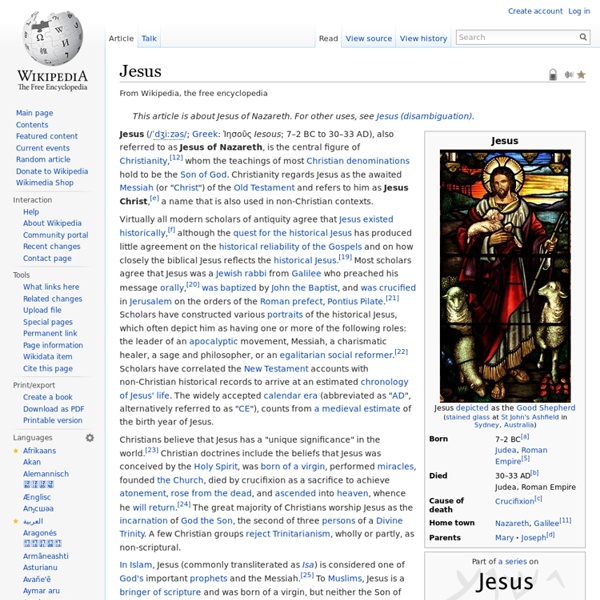Jesus
Jesus (/ˈdʒiːzəs/; Greek: Ἰησοῦς Iesous; 7–2 BC to 30–33 AD), also referred to as Jesus of Nazareth, is the central figure of Christianity,[12] whom the teachings of most Christian denominations hold to be the Son of God. Christianity regards Jesus as the awaited Messiah (or "Christ") of the Old Testament and refers to him as Jesus Christ,[e] a name that is also used in non-Christian contexts. Etymology of names Since early Christianity, Christians have commonly referred to Jesus as "Jesus Christ". The word Christ is derived from the Greek Χριστός (Christos),[28][37] which is a translation of the Hebrew מָשִׁיחַ (Meshiakh), meaning the "anointed" and usually transliterated into English as "Messiah".[38] Christians designate Jesus as Christ because they believe he is the awaited Messiah prophesied in the Hebrew Bible (Old Testament). Chronology A number of approaches have been used to estimate the year of the crucifixion of Jesus. Life and teachings in the New Testament
Jesus.net :: Who is Jesus? - Knowing God - Growing with Jesus - Sharing my faith
Home | clivejames.com
Knowing Jesus
By Steven L. Pogue If you’ve committed your life to Christ, you have a relationship with Him. That’s a great beginning! Developing that relationship involves getting to know Him better. The best way to learn about Jesus is to read His claims concerning His identity in the Gospels. Jesus was born about 4 or 5 B.C. The bulk of the Gospel accounts is devoted to the three years that Jesus spent ministering around the Sea of Galilee in northern Israel. Throughout his ministry Jesus kept pointing the people to Himself. Let’s examine four incidents in the Gospel of John to determine what Jesus claimed about Himself. John 5: Jesus Teaching God is His Father In the Gospel of John, chapter 5, Jesus was accosted by Jewish religious leaders for healing an invalid on the Sabbath (the Jewish “Day of Rest”). Jesus defended his action of healing on the Sabbath by explaining that God, as the sustainer of the universe, never rests but continually keeps working. Moses asked God who he should say sent him.
Related:
Related:



